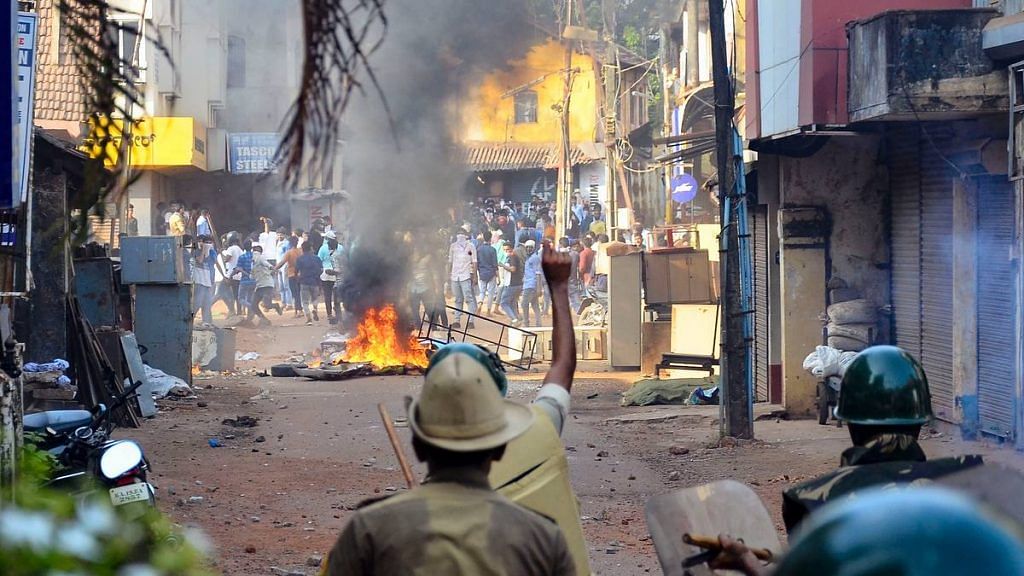Bengaluru: As the protests against the Citizenship Amendment Act continue across the country, Kerala-based radical group Popular Front of India (PFI) is back in the spotlight.
Over the past week, the PFI’s Uttar Pradesh head, Wasim, was arrested along with 16 workers for allegedly instigating violence in the state while the police in Assam also picked up its state unit president Aminul Hoque and Mohammad Muzammil Hoque, the press secretary of the organisation, for their alleged role in the violence in Guwahati.
The organisation was also blamed for the protests spiralling out of control in Karnataka’s Mangaluru.
Though it is not banned, the PFI has been under the radar of the National Investigation Agency (NIA) as its members were linked to ISIS modules in Kerala that went on to join the terror outfit in Syria and Iraq.
In May, PFI offices were raided as Indian intelligence officers suspected the organisation, along with the Tamil Nadu Thowheed Jamath, has played a part in radicalising the masterminds of the Sri Lankan Easter bombings on 21 April, which killed over 250 people.
In India, the PFI has been accused of being involved in several political killings, religious conversions apart from links to ISIS.
ThePrint called PFI treasurer P. Koya several times and left him text messages but he didn’t respond. This report will be updated if and when the PFI responds to the allegations.
Also read: TamTam is new ISIS favourite after Telegram. London Bridge attack was claimed here
What is the PFI?
Predominantly operating out of Kerala, the PFI emerged from its predecessor, the National Democratic Front (NDF), which was formed in 1993 in the aftermath of the Babri Masjid demolition in 1992.
NIA documents indicate that Kerala became the hotbed of several Muslim radical organisations after the demolition and the NDF was one such organisation.
In 2006, the NDF merged with the PFI.
While its stronghold is in Kerala, the PFI has expanded its footprint across the country subsuming similar-minded groups such as the Tamil Nadu-based Manitha Neethu Pasarai and the Karnataka Forum for Dignity among others.
According to the NIA, the PFI has a presence in almost 23 states in the country. It has immense clout, and political parties in both Kerala and Karnataka feel a ban on the PFI could be perceived as an anti-Muslim move.
While the PFI claims it is committed to ensuring justice and freedom for Muslims and stopping their persecution, it has often been accused of illegal activities deemed a threat to the country.
Love jihad & links to SIMI
One of the most controversial issues that the PFI has been linked with is the alleged love jihad in Kerala. In 2017, the NIA, which was then probing 94 ‘love jihad’ cases handed over to it by the Kerala Police, claimed that four PFI-linked men were behind forcing the conversion of Akhila Ashokan in the Hadiya case.
The NIA had then suspected that at least 23 of the 94 marriages were facilitated by the PFI.
The NIA alleged that the PFI-affiliate Sathyasarani Islamic Dawah Institute located in Manjeri, Malappuram, was behind forced religious conversion of Hindu women.
The PFI has also been linked to the banned outfit, the Students Islamic Movement of India (SIMI). Some PFI office-bearers were once associated with SIMI. PFI’s national chairman, Abdul Rehman, was earlier the SIMI national secretary while the organisation’s state secretary, Abdul Hameed, had held the same position in SIMI, which was banned in 2001.
Also read: God’s own Khilafat? Why Kerala is a hotspot for ISIS in India
Attack on professor, political killings
In 2010, PFI members allegedly attacked T.J. Joseph, an Idukki-based Malayalam professor and chopped off his right hand for allegedly including a “blasphemous question” that referred to Prophet Muhammad in a question paper.
In 2012, the then Kerala government submitted an affidavit in the state high court claiming that PFI workers were involved in 27 cases of murder of CPI(M) and RSS members.
The government claimed that most of the murders were communally motivated and that there had been attempts to kill 86 others. The affidavit was submitted in the backdrop of the murder of ABVP student leader Sachin Gopal, who was stabbed in Kannur.
In 2016, a local Karnataka RSS leader Rudresh was hacked to death by two motorcycle-borne men in the Shivajinagar area of Bengaluru. The Bengaluru police arrested four men with links to the PFI for the murder.
In November this year, Congress MLA Tanveer Sait was attacked by a youth, Farhan, who the police claim has links to the PFI. Following the incident, the Karnataka government is now contemplating recommending to the Centre to ban both the PFI and the Karnataka Forum for Dignity (KFD).
Training camps & an SMS campaign
In 2013, the PFI was accused of running a training camp at Narath in Kannur. The Kannur police claimed to have found swords, bombs, human-shaped wooden targets and ingredients to make crude IEDs and country-made guns at the Narath camp. They also allegedly found pamphlets and material that were being used to prepare young men to participate in terror activities.
A year earlier, in 2012, the PFI was accused of being part of a ‘hate’ campaign after major riots at Kokrajhar in Assam. The messages included threats and videos of revenge against those from the Northeast living in Southern India.
Investigators traced the source of these video hate messages to four major groups, Harkat-Ul-Jihad-al-Islami (HuJI), PFI’s Manila Neeti Parsarai and the Karnataka Forum for Dignity.
According to those close to the investigations, nearly 75 million messages were sent on a single day forcing a mass exodus of people of the Northeast from Bengaluru, Pune, Chennai, Hyderabad and Delhi.
Also read: Why, despite the havoc wreaked, Al-Baghdadi’s death isn’t being celebrated in Iraq
